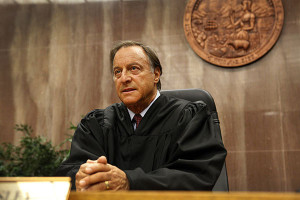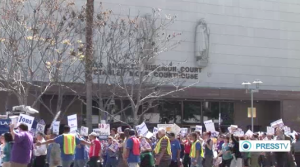San Diego County Documents Part Of Courts Crisis
Iranian TV News Still Covering Court Cuts
You can see the report (it’s in English) here.
Court Takes Beatings As State Passes Budget
Read the report here.
‘Hell Week’ Ends With Hundreds Of Friday Firings
Balanced budget? ‘Too little, to late’ for L.A. County court
While the Governor and legislators celebrate their $96.4 billion budget deal, workers at L.A. County court are waiting for their pink slips.
According to an L.A. Times story today: “The Los Angeles County Superior Court plans to eliminate more than 500 jobs by the end of the week in a sweeping cost-cutting plan to close a projected $85-million budget shortfall for the next fiscal year.” The story also includes a breakdown of the layoffs.

Photo credit: Al Seib/L.A. Times as part of the L.A. Times coverage of the L.A. County Court layoff story
As part of his deal with legislators, the governor agreed to restore $63 million to the courts in the budget that will take effect July 1– well short of the $100 million the Legislature wanted.
“We are glad that restoration of trial court funding has begun,” said L.A. County Superior Court presiding judge, David Wesley, in a statement. “But it is a shame that it is too little, too late, to stop the awful reductions in access to justice that state funding cuts have brought.”
Read the full story here.
Budget deal reached, but with compromises
Gov. Jerry Brown and lawmakers led by Senate President Pro Tem Darrell Steinberg and Assembly Speaker John Perez have reached a deal. The full Senate and Assembly must approve the budget by a midnight Saturday deadline.
The deal does not come without compromises. The Mercury News reports that legislative budget committee chair Sen. Mark Leno, D-San Francisco, and vice chair Assemblyman Bob Blumenfield, D-San Fernando Valley, both said at a legislative budget committee meeting late Monday that they agreed to Brown’s lower financial estimate “to reach a deal.”
“As all budgets are acts of compromise, this budget would be no exception,” Leno was quoted as saying in the story.
One of the compromises has hit the judicial budget. According to the story, $63 million will fund trial courts, less than the $100 million the Legislature wanted.
Read the Mercury News story here.
‘Public’ Budget Debate Is Fiction, Issues Really Settled In Private
Budget Fight Will Happen In A Hurry, Behind Closed Doors
That tick-tock you hear from Sacramento is the budget clock ticking away, with lawmakers facing loss of their paycheck if they miss the once-ignored June 15 budget deadline (voters put that penalty on them a few years ago). One of the more critical observers, the right-leaning Dan Walters at the Sacramento Bee, outlines what we can expect and explains what the lawmakers mean when an item, like the state courts funding, is being “left open.”
“That’s political speak for those items that will not be resolved in public but rather behind closed doors, with the largest left to Gov. Jerry Brown and the Legislature’s top leaders,” writes Walters, adding that “… the committee’s public sessions are aimed at maintaining the fiction that writing the budget – more than $200 billion in all forms of spending – is an open process. Their major value, really, is to provide clues to the many conflicts that linger just 10 days before the constitutional deadline for enactment.”
It’s worth noting that increasing courts funding by $100 million dollars is not at issue between the Assembly and Senate, but remains unresolved between lawmakers and the governor. At any rate, Democrats are in total control: Up until three years ago, it took a two-thirds vote to pass a budget, but you may recall voters passed a constitutional amendment requiring only a majority. Walters contends that an “unintended consequence” is that lawmakers have less time to work out disagreements.
You can get a good overview from his column here.
